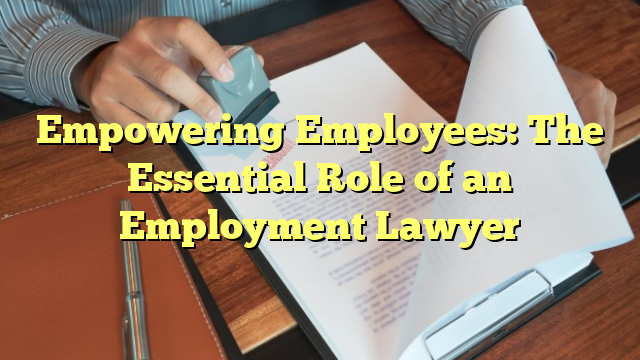The workplace is a complex environment governed by various laws and regulations designed to protect employees’ rights. However, disputes and challenges can arise, leaving individuals facing employment-related issues that require legal expertise.
In these situations, the guidance and support of an employment lawyer become invaluable. Employment lawyers are legal professionals specializing in employment law, working to protect the rights and interests of employees. In this article, we will explore the role of an employment lawyer, their responsibilities, and how they assist individuals in navigating the intricacies of employment law. Lawyer Mobile App
I. Understanding Employment Law and Its Significance
- Overview of Employment Law: Employment law encompasses a broad range of legal regulations and statutes that govern the relationship between employers and employees. It covers various aspects, including hiring practices, wages, working conditions, discrimination, harassment, wrongful termination, and more. Employment lawyers possess a deep understanding of these laws and provide guidance to employees facing legal challenges.
- Employee Rights and Protections: Employment law is primarily focused on protecting the rights and interests of employees. It ensures fair treatment, equal opportunities, safe working conditions, and protection against discrimination or harassment. Employment lawyers are advocates for employees, working to safeguard their rights and enforce the provisions of employment laws.
- Employment Contracts: Employment lawyers assist employees in reviewing and negotiating employment contracts to ensure their interests are protected. They analyze contract terms, including compensation, benefits, non-compete clauses, and termination provisions, to ensure compliance with employment laws and to advocate for favorable terms.
- Workplace Discrimination and Harassment: Discrimination and harassment based on factors such as race, gender, age, religion, or disability are strictly prohibited in the workplace. Employment lawyers help employees who have experienced discrimination or harassment navigate the legal process, file complaints, and seek appropriate remedies.
- Wrongful Termination: Wrongful termination occurs when an employee is unlawfully fired or dismissed. Employment lawyers investigate the circumstances surrounding the termination, assess potential legal violations, and pursue legal action to protect the employee’s rights and seek compensation for damages.
II. The Role of an Employment Lawyer
- Legal Advice and Consultation: Employment lawyers provide crucial legal advice and consultation to employees facing workplace issues. They help individuals understand their rights, evaluate the strengths and weaknesses of their case, and provide guidance on the best course of action.
- Contract Negotiation and Review: Employment lawyers assist employees in negotiating employment contracts or reviewing existing contracts to ensure compliance with employment laws. They advocate for fair and reasonable terms and protect employees’ rights during the negotiation process.
- Workplace Investigations: In cases of workplace discrimination, harassment, or wrongful termination, employment lawyers conduct thorough investigations. They gather evidence, interview witnesses, and analyze relevant documents to build a strong case on behalf of the employee.
- Filing Legal Claims: When an employee’s rights have been violated, an employment lawyer helps them file legal claims. They prepare the necessary documentation, meet filing deadlines, and represent the employee’s interests in administrative proceedings or court.
- Mediation and Settlement: Employment lawyers are skilled negotiators who strive to resolve disputes through mediation or settlement negotiations. They engage with the employer or their legal representatives to reach mutually agreeable solutions, saving time, cost, and the emotional toll of litigation.
- Litigation and Representation: In cases where settlement negotiations fail, employment lawyers represent employees in court. They develop legal strategies, present arguments, examine witnesses, and advocate for their clients’ rights and interests during trial.
- Protection from Retaliation: Retaliation by employers against employees who assert their rights is illegal. Employment lawyers provide protection to employees, ensuring they are not subjected to adverse actions as a result of asserting their rights or pursuing legal claims.
III. The Benefits of Hiring an Employment Lawyer
- Expertise in Employment Law: Employment lawyers possess comprehensive knowledge of employment laws, regulations, and case precedents. Their specialized expertise allows them to navigate the complexities of employment disputes and provide accurate legal advice tailored to the employee’s specific situation.
- Increased Chance of Success: With their deep understanding of employment laws, procedures, and legal strategies, employment lawyers significantly increase the likelihood of a successful outcome for employees. They build strong cases, gather compelling evidence, and present persuasive arguments to support their clients’ claims.
- Protection of Rights: Employment lawyers are dedicated advocates for employees, ensuring their rights are protected throughout the legal process. They safeguard individuals from unfair treatment, discrimination, harassment, or wrongful termination, seeking appropriate remedies and compensation for damages suffered.
- Objective Guidance: Emotions can run high during employment disputes, affecting decision-making and judgment. Employment lawyers provide objective guidance, offering a rational perspective and helping employees make informed choices that align with their best interests.
- Mitigation of Power Imbalance: Employees often face a power imbalance when challenging their employers. Employment lawyers level the playing field by providing professional representation and legal support. They act as a strong advocate for employees, balancing the scales of justice.
- Access to Resources: Employment lawyers have access to a network of resources, including expert witnesses, investigators, and other professionals who can strengthen the employee’s case. They leverage these resources to build robust legal arguments and maximize the chances of a favorable outcome.
- Efficient Process: Employment disputes can be time-consuming and complex. Employment lawyers streamline the process, handle administrative tasks, meet deadlines, and ensure compliance with procedural requirements. Their efficiency saves employees valuable time and reduces the stress associated with navigating the legal system.
Conclusion
Employment lawyers play a vital role in protecting the rights and interests of employees facing workplace challenges. Their expertise in employment law, negotiation skills, and advocacy ensure that employees are empowered to assert their rights, seek justice, and achieve favorable outcomes.
By understanding the significance of employment lawyers and the invaluable services they provide, individuals can make informed decisions, navigate complex legal processes, and stand up against unfair treatment in the workplace. With an employment lawyer by their side, employees can assert their rights with confidence and work towards a more equitable and inclusive work environment.
